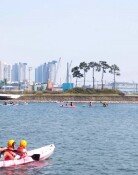‘2nd, 3rd presidential libraries’ feared amid lavish fiscal policy
‘2nd, 3rd presidential libraries’ feared amid lavish fiscal policy
Posted September. 16, 2019 07:32,
Updated September. 16, 2019 07:32
Deputy Prime Minister and Finance Minister Hong Nam-ki mentioned “downward move” eight times and “difficulty” 10 times in his briefing on next year’s state budget on August 27. Minister Hong apparently indicated that people’s livelihood is getting from bad to worse amid growing downward risks of a rapid economic slump. Citing this, the minister claimed that the government has no choice but to set aside an “ultra-super” budget of 513 trillion won for next year. To this end, the government decided to issue government bonds worth 60 trillion won. This amount is nearly double the size of the Seoul Metropolitan government’s budget of 35 trillion won for this year.
It is true that the fiscal policy should play a more proactive role amid a lack of vitality in the private sector. The question is where and how the government will spend the state budget. The presidential office of Cheong Wa Dae announced last week that President Moon Jae-in does not want to build an independent library for storing documents and materials on his presidency, which had been pushed for by the National Archive of Korea under the Interior and Safety Ministry. The library plan entailed an investment of 17.2 billion won in taxpayers’ money, including 3.2 billion won for land purchase. The presidential office immediately sought to end discussions about the plan, saying that the president was infuriated upon learning about the plan, but the ministry had already consulted with presidential aides in charge, before getting the plan approved at a Cabinet meeting. The ministry apparently attempted to give a boost to the president’s mood and sentiment by taking advantage of a lavish state budget.
When a fiscal stimulus package is used properly, it could help bolster the economy, but when misused, it does more harm than good. The government sector generally accounts for less than 20 percent of Korea’s gross national product. Government-driven economic stimulus measures will only have limited impact on boosting growth. For this reason, when the government ends stimulus measures, the economy often deteriorates further and ends up falling into a “double dip recession.”
As the government pumps in more taxpayers’ money in a vicious cycle, the country ends up in a chronic fiscal deficit. When only the national account is taken into consideration, an expansion of state finances sucks up resources from the private sector before releasing them, which in turns causes the market’s roles and functions to contract. Over the long term, this will lead to either a hike in taxes levied on future generations or the government’s issuing of more currency to cut government debts. The measure may be okay in the short term but will eventually end up reducing the government’s capacity to increase spending. The more closed an economy is, the higher the effect of such fiscal policy gets, which in turn can drive the country to strengthen protectionist trade policy.
The worse of all is politically motivated spending of state finances. Since the bursting of its economic bubble in the 1990s, Japan started expanding public investment and injected more than 1000 trillion won in the construction of airports and other facilities. Despite excessive supply in the economy over the period, Tokyo focused on short-term stimulus measures without economic restructuring, and lying behind this process was collusion between political forces chasing after votes and the government. Japan’s “lost 20 years” results from both political failures and misdiagnosis on its economy.
These days, South Korean government agencies are reportedly mulling over how to spend next year’s budget that has increased unexpectedly. Critics say that some ministries simply put an extra “zero” in their proposed budgets, and ended up getting an unprecedented amount of budget. In times like this, technocrats could often voluntarily seek to offer politicians pork-barreling projects for elections, or politicians could engage in dogfight with each other to secure more budgets for their constituencies ahead of next year’s general elections. Unless the public keeps a close watch, a second and a third presidential library will surface out of nowhere to increase burden on taxpayers' shoulders.
koh@donga.com







